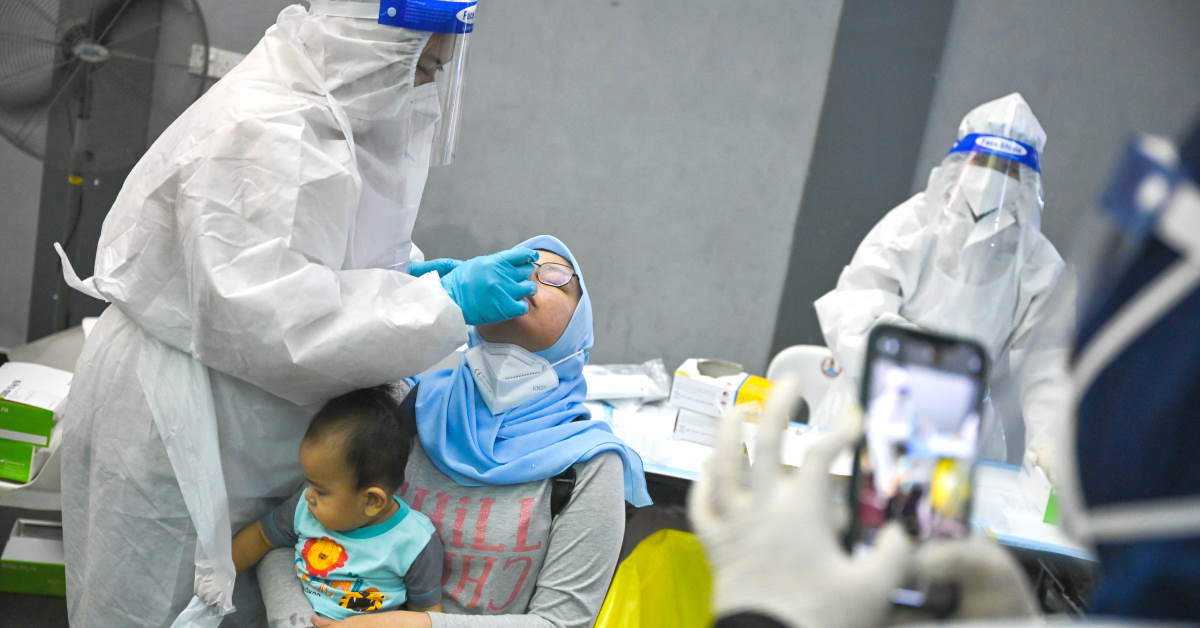Southeast Asian countries, including nations that managed to control the coronavirus last year, are struggling to contain recent outbreaks as new variants and vaccine shortages leave populations exposed.
Thailand’s cumulative caseload has more than quadrupled since 1 April, rising to almost 130,000, after infections spread in its cramped prisons, densely populated areas of the capital and construction sites.
In neighbouring Malaysia, field ICUs are being established to cope with the increase in patients with severe illness, while one hospital converted a shipping container to a makeshift morgue because its facility was overrun. The country reported almost 7,000 cases on Sunday.
Vietnam and Singapore – both widely praised for their success in containing the coronavirus – are also racing to contain clusters, and have introduced lockdown measures.
Cases are far lower than the peaks seen in other areas of the world, but health experts say the outbreaks are a warning sign that vaccines must be distributed more evenly. “It is entirely possible that because of the inequity that we are starting to see in accessing vaccines that the epicentre [of the pandemic] will shift,” said Teo Yik Ying, a professor at the Saw Swee Hock School of Public Health, National University of Singapore.
Frightening Speed
He did not believe the recent outbreak in Singapore was due to a lack of compliance with health measures, but said it was instead driven by the more aggressive nature of the new strain B.1.617, which was first detected in India. “Our defences that we put in place that have worked very well for the past one year now seem to be being breached by the coronavirus,” he said.
“It is the speed that is frightening. We’ve seen how we have got four generations of spread – meaning from the index case to the primary transmission, and then to secondary transmission and so on – within a period of 10 days. Compared to what we were faced with last year, it is quite a different situation,” he said.
While Singapore has fully vaccinated one quarter of its population, immunisation campaigns have been far slower elsewhere in the region. Thailand has fully vaccinated fewer than 1.5 percent of its population, while only 2.88 percent of people in Malaysia have received both jabs.
Vietnam, which has imposed lockdowns in some districts in a race to contain new clusters, has fully vaccinated less than one percent of its population. Its recent outbreak has led to more than 2,000 new cases since late April – almost 40 percent of the 5,119 cumulative infections detected in the country since the pandemic began.
Malaysia has imposed a full lockdown in its fourth-largest city, Ipoh, while other restrictions, such as shorter opening hours for businesses, have been announced elsewhere. “If the same picture continues for one or two weeks, it will be very hard for the health system in the country to cope,” said Dr Abhishek Rimal, Asia health coordinator for the International Federation of the Red Cross.
Health experts in Malaysia fear that social activities for Eid al-Fitr may lead to a rise in cases detected over the coming week. Restrictions were imposed, but just days before the holiday.
Balancing Act
Governments faced a difficult balancing act, said Rimal. “When they [introduce] a lockdown there are so many people who are daily wage workers. What will happen to their income, their food, to their family? That is one of the biggest humanitarian challenges,” he said.
Thailand, which imposed strict measures last year and virtually eradicated the virus, has stopped short of a full lockdown. Instead, it has allowed shopping malls to remain open and permitted restaurants to operate at 25 percent capacity. Schools, parks, gyms and businesses such as massage parlours and bars are shut.
Cases have spread rapidly in Thailand’s notoriously crowded prisons, infecting thousands of inmates, and prompting the government to consider releasing some early. Construction worker camps, where many migrant workers live in shared rooms, have also emerged as hotspots for the virus.
On Friday, Thailand identified its first domestic cases of the B.1.617.2 variant, which had infected 15 people, including 12 construction workers at a camp in northern Bangkok. About 1,100 of the 1,667 workers at the site tested positive. The variant that was first identified in South Africa has also been detected in the country.
“The government needs to assure the workers that if they get COVID, they will be treated equally,” said Adisorn Kerdmongkol, coordinator of Migrant Working Group. He said many people worried they would not be able to receive care, and lacked information about what to do if they had symptoms. The government should also allay fears that migrants will be penalised if they come forwards for treatment and are found to not have the correct papers, he said. – Guardian
